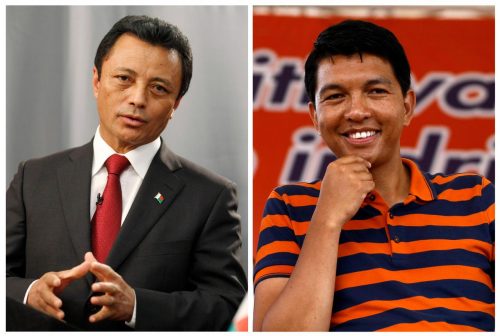ANTANANARIVO, Dec. 20,, Both candidates in Madagascar’s presidential election have claimed victory in the fierce battle for power in the Indian Ocean island.
Andry Rajoelina and Marc Ravalomanana — who have each held the top job in the impoverished country before — declared themselves winners in the run-off which analysts warned was likely to draw claims of fraud.
“Change is coming tomorrow, and today you can say that ‘Papa’ is elected,” Ravalomanana told supporters on Wednesday night at his headquarters, using his nickname. “Whatever happens, only one thing counts, we will win.”
However, his rival Rajoelina said: “I am sure I’m going to win but we’ll wait for the official results.”
The contenders, who came a close first and second in November’s first-round election, were both banned from running in the 2013 ballot as part of an agreement to end recurring crises that have rocked Madagascar since independence from France in 1960.
In the first round, Rajoelina won 39 percent compared with 35 percent for Ravalomanana. Both camps alleged they were victims of fraud and cheating.
The polls closed on Wednesday evening. The election count could be tense with the first significant results due only by next week.
The EU observer mission, which said turnout was around 50 percent, called for candidates and their supporters to wait patiently for the official results.
“It is not by mobilising in the street that they will win, so I ask them resolutely that they refrain from any gesture that could taint the smooth running of the election,” mission chief Cristian Preda said Wednesday.
– Bitter history –
Ravalomanana, 69, was first elected president in 2002 but was forced to resign seven years later by violent demonstrations supported by Rajoelina, the then mayor of the capital Antananarivo.
Rajoelina, 44, was installed by the army and ruled until 2014. The two contenders criss-crossed the country via helicopter to secure votes.
Both candidates have spent lavishly, with promises and handouts distributed liberally to voters, who are among the poorest in Africa.
With the personalities of the two men dominating the election, issues such as poverty, corruption and lack of basic services and infrastructure have been largely pushed to the side.
Some analysts warn a fractious election fallout could damage the chances of future development.
“The results could be very tight and, in this context, even small irregularities could lead one or the other candidate to contest them,” said Marcus Schneider, an analyst at the Bonn-based Friedrich Ebert Foundation.
– High stakes –
Former education minister Paul Rabary, a fringe candidate who was eliminated in the first round, said the stakes were high: “For Marc Ravalomanana, his business network cannot survive if he does not take power. For Rajoelina, his personal history is sullied by the (2009) coup, so he must win to rescue his honour.”
Ravalomanana is a former milkman from a peasant family who went on to build a business empire, while Rajoelina is a former party planner and successful entrepreneur with slick communication skills.
Outgoing president Hery Rajaonarimampianina was eliminated in the first round after collecting less than nine percent of the vote.
His attempts to change the electoral laws this year backfired, sparking nearly three months of sometimes violent protests in Antananarivo.
The demonstrators forced Rajaonarimampianina to accept a “consensus” government tasked with organising the election.
Madagascar is well known for its vanilla and precious redwood, yet is one of the world’s poorest nations, according to World Bank data, with 76 percent of people living in extreme poverty.
The island, which is also famed for its unique wildlife, is dependent on foreign aid and burdened by a long history of coups and unrest.
“My choice is already made, but I keep it to myself,” 45-year-old housewife Monique Norosoa told AFP as she voted in the capital.
—
Both candidates declare victory in Madagascar presidential run-off
 FILE PHOTO: A combination photo shows former Madagascar's Marc Ravalomanana on February 17, 2011 and former Madagascar's President Andry Rajoelina on December 18, 2013 respectively. REUTERS/Mike Hutchings and REUTERS/Thomas Mukoya/File Photos
FILE PHOTO: A combination photo shows former Madagascar's Marc Ravalomanana on February 17, 2011 and former Madagascar's President Andry Rajoelina on December 18, 2013 respectively. REUTERS/Mike Hutchings and REUTERS/Thomas Mukoya/File Photos 